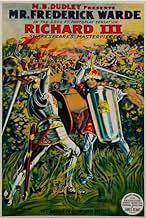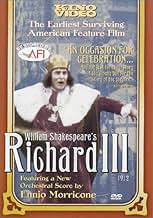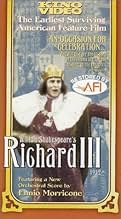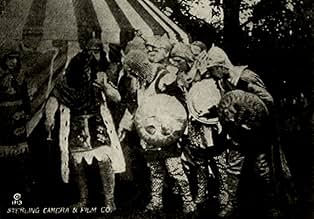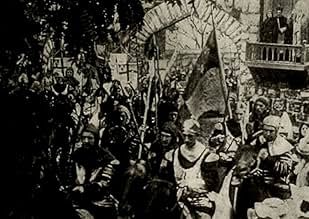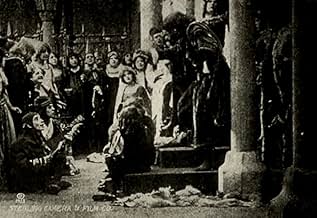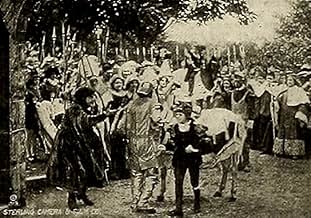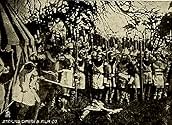Adicionar um enredo no seu idiomaRichard of Gloucester uses manipulation and murder to gain the English throne.Richard of Gloucester uses manipulation and murder to gain the English throne.Richard of Gloucester uses manipulation and murder to gain the English throne.
- Direção
- Roteiristas
- Artistas
- Direção
- Roteiristas
- Elenco e equipe completos
- Produção, bilheteria e muito mais no IMDbPro
Avaliações em destaque
After watching RICHARD III, I found the film endlessly fascinating. Part of the fascination lies in the age of the film itself. You rarely get to see a film from 1912 much less one in excellent condition. I felt as if I had gone back in time to a 19th century theatre which in effect I had as the actor playing Richard (Frederick Warde) was a legendary stage actor who came out of retirement to reprise his favorite role on film and have it captured for posterity. Much of RICHARD III is appropriately theatrical in nature with very theatrical sets but it is the exteriors that turn it into a real motion picture. Although the camerawork is static, the editing is imaginative and keeps it from being just a filmed play.
The DVD transfer of the film is remarkable. The color tints (mostly yellow and red) are effective and the print looks great for the vintage. The period intertitles are intriguing with Gloucester spelled phonetically (Gloster) for some reason. The commissioned score from Ennio Morricone is powerful, relentless, and highly effective. I strongly recommend this title to anyone interested not only in early movies but also in theatre history. This is a rare opportunity to see a genuine 19th century performance and the oldest surviving American feature film. However, be advised that this film isn't for everyone not even fans of Shakespeare. Now that the remains of Richard III have been found, the more discerning among you should give it a try in his honor...For more reviews visit The Capsule Critic.
The DVD transfer of the film is remarkable. The color tints (mostly yellow and red) are effective and the print looks great for the vintage. The period intertitles are intriguing with Gloucester spelled phonetically (Gloster) for some reason. The commissioned score from Ennio Morricone is powerful, relentless, and highly effective. I strongly recommend this title to anyone interested not only in early movies but also in theatre history. This is a rare opportunity to see a genuine 19th century performance and the oldest surviving American feature film. However, be advised that this film isn't for everyone not even fans of Shakespeare. Now that the remains of Richard III have been found, the more discerning among you should give it a try in his honor...For more reviews visit The Capsule Critic.
This was a very, very early full-length film. According to the video box, it was the first full-length American-made film, but that is debatable--as several films have made that claim and exactly what constitutes "full-length" is pretty vague. Regardless, I have to commend the cast for trying something unique and epic, though in today's light the film is a totally boring mess and only of interest to cinephiles. Instead of the modern notion of story-telling and action, the crew was breaking new ground and made a bizarre film that appears more like a series of vignettes instead of a coherent film. Instead of a moving and evolving narrative like we are used to, the film was made with a real-life traveling acting troop. But, instead of having them act out the story, the film shows inter-title cards that describe what has occurred and the cast pose like they are going to be photographed or just make a few minimal movements or actions until the next card appears to describe an all-new scene. It's almost like looking at a series of stereoscope cards that move just a little and all together tell a very, very dull story. Very static and horrid to watch, it DID try something different and this is an amazingly important film historically--I just would NEVER want to have to watch it again!
Watching Shakespeare without dialog isn't as challenging as you might think. Indeed, this 1912 film manages to condense the play neatly and still retains much of the power of the piece without hearing - or even reading - the words. Much of the success of "Richard III" is due to the vivid characterization by Frederick Warde, but his costars are excellent too. The direction is basic, of course, and every so often director-star James Keane wastes precious time (what's up with that long semi-tracking shot of the ship?), but generally his work is more than adequate. Comparing Keane's work here to the pioneering 1911 Italian feature "L'Inferno", it's clear that the American did have knowledge of what was going on elsewhere, even if he (of course) fell far short of what D.W. Griffith was already doing. Overall, "Richard III" will be of considerable interest to silent-film fans as well as stage performers interested in viewing the work of 19th century master Warde. Otherwise, I doubt this movie will thrill many other viewers. But I could be wrong; check it out for yourself.
Besides its historical importance, this silent screen adaptation of Shakespeare's "Richard III" is a pretty good movie in its own right. It has several good features that compensate for the lack of dialogue and the other cinematic limitations of the time. The result is something a bit different from watching the play, but still a good story that does retain much of the emphasis of the original.
The adaptation is noteworthy for the liveliness and the detail that went into most of the scenes. They also made generally good decisions in adapting the story, by high-lighting the parts that would work most effectively on film without dialogue, and also in filming some events that were not actually in the play but to which characters in the play refer. While the lack of dialogue means that the character of Richard is not as complex as he is in the play, Frederick Warde does a good job of making his basic character come out. Some of his scenes work better than you might have expected them to without the advantage of spoken lines. The camera is fixed for each scene, as was then the norm, and it also uses the old-fashioned 'tableau' format, but there are a number of uses of cross-cutting, and there are also a couple of simple tracking shots at effectively chosen moments.
Overall, this is creative for its era, and it works quite well. It deserves to be seen in its own right, as well as for its more well-known historical significance.
The adaptation is noteworthy for the liveliness and the detail that went into most of the scenes. They also made generally good decisions in adapting the story, by high-lighting the parts that would work most effectively on film without dialogue, and also in filming some events that were not actually in the play but to which characters in the play refer. While the lack of dialogue means that the character of Richard is not as complex as he is in the play, Frederick Warde does a good job of making his basic character come out. Some of his scenes work better than you might have expected them to without the advantage of spoken lines. The camera is fixed for each scene, as was then the norm, and it also uses the old-fashioned 'tableau' format, but there are a number of uses of cross-cutting, and there are also a couple of simple tracking shots at effectively chosen moments.
Overall, this is creative for its era, and it works quite well. It deserves to be seen in its own right, as well as for its more well-known historical significance.
Credited as the earliest complete feature-length American film known to still exist and restored by the American Film Institute, "The Life and Death of King Richard III" is otherwise of little value. Rarely is Shakespeare nearly as boring. Yes, the film is a symptom of its time; I also watched "Queen Elizabeth" (1912) today (it wasn't a very good day), and both are arid and static adaptations from the stage, histrionic acting included, but without sound, or any other qualities of the theatre. Films such as these, however, were coincident with films by others like D.W. Griffith; one can easily see which was advancing the medium and which was hampering it.
Você sabia?
- CuriosidadesThought lost for decades, but a pristine print (believed to be the oldest known complete surviving feature film made in the US) was discovered by a private collector in 1996 and donated to the American Film Institute.
- ConexõesFeatured in Keepers of the Frame (1999)
Principais escolhas
Faça login para avaliar e ver a lista de recomendações personalizadas
Detalhes
- Data de lançamento
- Países de origem
- Idiomas
- Também conhecido como
- Mr. Frederick Warde in Shakespeare's Masterpiece 'The Life and Death of King Richard III'
- Locações de filme
- Empresas de produção
- Consulte mais créditos da empresa na IMDbPro
Bilheteria
- Orçamento
- US$ 30.000 (estimativa)
- Tempo de duração55 minutos
- Mixagem de som
- Proporção
- 1.33 : 1
Contribua para esta página
Sugerir uma alteração ou adicionar conteúdo ausente

Principal brecha
By what name was Richard III (1912) officially released in Canada in English?
Responda
